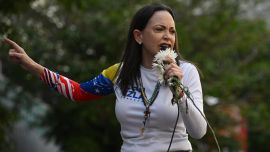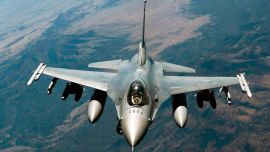President Alberto Fernández has announced that Argentina has joined the BRICS group of emerging economies, confirming the nation will be one of six new members.
Via a pre-recorded message that was released at 8am this morning, the president hailed "a new opportunity" for Argentina and revealed that negotiations had begun a year ago.
"We are going to be protagonists of a common destiny in a bloc that represents more than 40 percent of the world's population," he declared.
The BRICS bloc is made up of Brazil, Russia, India, China and South Africa. The group, which wants to expand its geopolitical influence and reshape the Western-led global order, has decided to accept membership applications from Argentina, Saudi Arabia, Egypt, Ethiopia, the United Arab Emirates and Iran.
According to Casa Rosada sources, Fernández received a call yesterday from Brazilian President Luiz Inácio Lula da Silva "to let him know it was going to happen."
The sources said that the government had known about it “for a week,” but that the summit and approval mechanism had to take place first.
Lula congratulated his Argentine counterpart in a post on Twitter on Thursday.
News of the accession was not met with widespread acclaim in Argentina. Patricia Bullrich, the opposition presidential hopeful for the Juntos por el Cambio coalition, said Thursday morning from Buenos Aires that Argentina had "exposed its position" with the application.
"The president has just committed Argentina to joining the BRICS, while the invasion of Ukraine is taking place and, what's more, with the entry of Iran [to the BRICS], we have a country with which Argentina has a deep open wound, due to anti-Semitic terrorist attacks in our territory," she said at an event.
Bullrich vowed to pull Argentina out, should she win the election. “Under our government, Argentina will not be in the BRICS," she declared.
The other leading candidate for the presidency in Argentina’s October election, libertarian lawmaker Javier Milei, is an outspoken critic of the governments in Brazil and China, which he brands “communist.”
BRICS confirmation
News of the expansion was also confirmed by South African President Cyril Ramaphosa on Thursday. The group agreed at their annual summit to make Argentina, Ethiopia, Iran, Saudi Arabia, Egypt and the United Arab Emirates full members starting from January 1.
"This membership expansion is historic," said Chinese President Xi Jinping, whose nation is the most powerful in the group of large and populous non-Western economies.
"The expansion is also a new starting point for BRICS cooperation. It will bring new vigour to the BRICS cooperation mechanism and further strengthen the force for world peace and development.”
The expansion question was one of the main topics of debate at the three-day event in South Africa and gave rise to divisions among the current members over the pace and criteria for incorporating new nations.
But the group – which makes its decisions by consensus – agreed on "principles, standards, criteria and guiding procedures for the BRICS expansion process," Ramaphosa said.
In his video message, President Fernández said that the process to join the bloc had begun a year ago, when he sent a formal note to Xi and the bloc’s other leaders.
According to the Peronist leader, the initiative was based on "the conviction that this was a necessary political and economic platform in the face of an unstable and inequitable world where countries with emerging economies require greater levels of integration.”
"A new scenario is opening up for Argentina, we are going to be protagonists of a common destiny in a bloc that represents more than 40 percent of the world's population and at the same time we continue to strengthen our fruitful, autonomous and diverse relations with other countries in the world," declared Fernández in his address to the nation.
The president said that the alliance with other economies increases "our possibilities of opening new markets, consolidating existing markets, favouring investment flows, creating jobs, increasing exports and developing the application of new and better technologies".
The majority of the other new members were equally delighted. Ethiopian Prime Minister Abiy Ahmed hailed what he called "a great moment" for his country, the second-most populous in Africa.
In Iran, senior presidential advisor Mohammad Jamshidi described the move as a "historic development and a strategic success" for Tehran's foreign policy.
Egypt and the UAE also broadcast their readiness to work with the loosely-defined group that represents billions of people on four continents and a quarter of the world's wealth.
However, the Saudi response was non-committal on Thursday, with Foreign Minister Prince Faisal bin Farhan telling Al-Arabiya television that Riyadh was "awaiting details" about the invitation and would "take the appropriate decision.”
'Strength in diversity'
Calls to enlarge the BRICS dominated its annual summit in Johannesburg and exposed divisions over the rules for entry.
But the group, which makes decisions by consensus, agreed on the six nations after approving criteria for entry that were not made public following three days of bilateral talks and closed-door meetings.
It paves the way for future expansion of a disparate group of big and small economies that encompasses both the world's largest democracy and its largest authoritarian state.
"BRICS will continue to open to new members," said Lula, who personally advocated for the admission of Argentina.
Nearly two dozen countries have formally applied to join and about the same number have expressed interest from non-Western nations across the so-called Global South.
Some 50 world leaders attended this week’s summit, underscoring what BRICS leaders say is the attractiveness of its message and growing relevance on the world stage.
Founded in 2009 and expanded the following year to include South Africa, the BRICS has risen to prominence at a time of intense geopolitical rivalry and analysts foreshadowed that its 15th summit could be pivotal.
China had been campaigning to rapidly grow the BRICS into a counterweight to the G7 group of wealthy democracies amid growing strategic competition with the United States.
US officials have played down the likelihood of BRICS emerging as a geopolitical rival, describing the bloc as a highly diverse grouping of both friends and rivals.
But despite differences, BRICS leaders expressed a shared belief that the Western-dominated global system did not serve developing nations, and an alternative was needed.
"Our diversity strengthens the fight for a new international order," said Lula.
Fragmentation
BRICS leaders championed its New Development Bank as a fairer lender for emerging economies than US-based institutions like the World Bank, and advocated that local currencies replace the US dollar in trade among its members.
UN Secretary-General Antonio Guterres said an overhaul of the world's "outdated, dysfunctional, and unfair global financial architecture" was necessary "but it won't happen overnight".
"For multilateral institutions to remain truly universal, they must reform to reflect today's power and economic realities... In the absence of such reform, fragmentation is inevitable," he told leaders in Johannesburg.
Analysts said Brazil, South Africa and India would need to balance their proximity to China and Russia without alienating a strong trading partner in the United States.
The admission of oil-producing giants Iran, Saudi Arabia and UAE would boost the BRICS economic clout but some observers said Tehran's inclusion risked colouring the bloc an anti-American hue.
"Iran is a contentious addition, but I certainly think it was a demand from Russia," said Gustavo de Carvalho, senior researcher at the South African Institute of International Affairs.
The summit in Johannesburg also underlined divisions with the West over the war in Ukraine, and the support Russia enjoys from its BRICS partners despite its global isolation.
South Africa, China and India have not condemned Russia's invasion while Brazil has refused to join Western nations in sending arms to Ukraine or imposing sanctions on Moscow.
Russia President Vladimir Putin, who is the subject of an international arrest warrant, was the only leader not present in Johannesburg and addressed the summit via video link.
– TIMES/AFP/PERFIL

























Comments